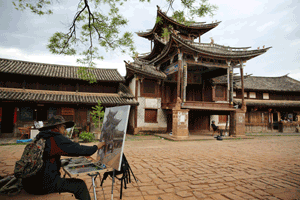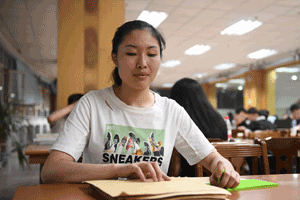'One Country, Two Systems' 'best suits' HK
Former chief secretary says Deng Xiaoping's unique vision for the city has been vindicated 20 years on
"One Country, Two Systems" is clearly the best arrangement for the city, said former chief secretary for administration Henry Tang Ying-yen.
Tang, now a member of the Standing Committee of the National Committee of the Chinese People's Political Consultative Conference, said "One Country, Two Systems", which is late Chinese leader Deng Xiaoping's innovative idea for the future of Hong Kong after 1997, had been quite successfully implemented.
He said the system fully reflected the principles of a high degree of autonomy and Hong Kong people governing Hong Kong, while the Basic Law is deemed the supreme law of Hong Kong and the basis of many existing laws.
|
Henry Tang Ying-yen, former chief secretary for administration and now a member of the Standing Committee of the National Committee of the Chinese People's Political Consultative Conference, believes Hong Kong and its people have been enjoying the advantages of the innovative "One Country, Two Systems" principal for the past 20 years and suggests the next government focus on economic development and people's livelihoods. Roy Liu / China Daily |
"The model of 'One Country, Two Systems' is the best arrangement for Hong Kong as a special administrative region of China," Tang told China Daily in an exclusive interview in the run-up to the 20th anniversary of China resuming the exercise of sovereignty over Hong Kong.
"The reason is Hong Kong has a very unique history. Not only was it ruled by Britain for over 150 years, it also carries more than 5,000 years of Chinese traditions and civilization," he said.
"If Hong Kong were returned to the country under 'One Country, One System', it would be more difficult for adaptation and interaction between the country and Hong Kong."
Tang notes that "a high degree of autonomy" does not mean full autonomy - as claimed by many in the opposition camp.
He said it was equally absurd for them to claim the central government has no say in Hong Kong affairs with the exception of defense and foreign affairs.
He agreed with Zhang Dejiang, chairman of the National People's Congress Standing Committee (NPCSC), who recently said at a forum on the 20th anniversary of the implementation of the Basic Law of the Hong Kong SAR in Beijing that "the power HKSAR exercises is delegated by but not separated from the central government. Under no circumstances should anyone be allowed to challenge the power of the central government in the name of a high degree of autonomy."
Discussing political reform, Tang believes it should be shelved for one term (five years) so society can have some respite.
On this issue, he again criticized the opposition camp. "It is ridiculous that, as they urge reopening the political reform, they oppose the constitutional framework that the NPCSC set out on Aug 31, 2014."
Tang, who sought passage of the political reform for the 2012 elections while he was the SAR government's No 2 official, lamented that society was exhausted after hard political struggles. He suggested the next government focus on economic development and people's livelihoods.
"It consumes a great deal of the government's energy and political stakes every time it engages in political reform," Tang said.
"I am in a very good position to comment because I saw political reform pass (in 2010) but also tasted defeat when it was vetoed (in 2005 when he was financial secretary)."
The Legislative Council passed the electoral reform proposal on the formulas of 2012 Chief Executive and LegCo elections in June 2010, which was assented by the CE and approved by the NPCSC later that year.
joseph@chinadailyhk.com

- Dalian center gives hope to women, new life to embryos
- China holds inter-provincial disaster relief drill
- 20 years prove success of 'one country, two systems': official
- Backgrounder: What are supercomputers?
- China's two supercomputers still world's fastest as US squeezed out of 3rd place


























